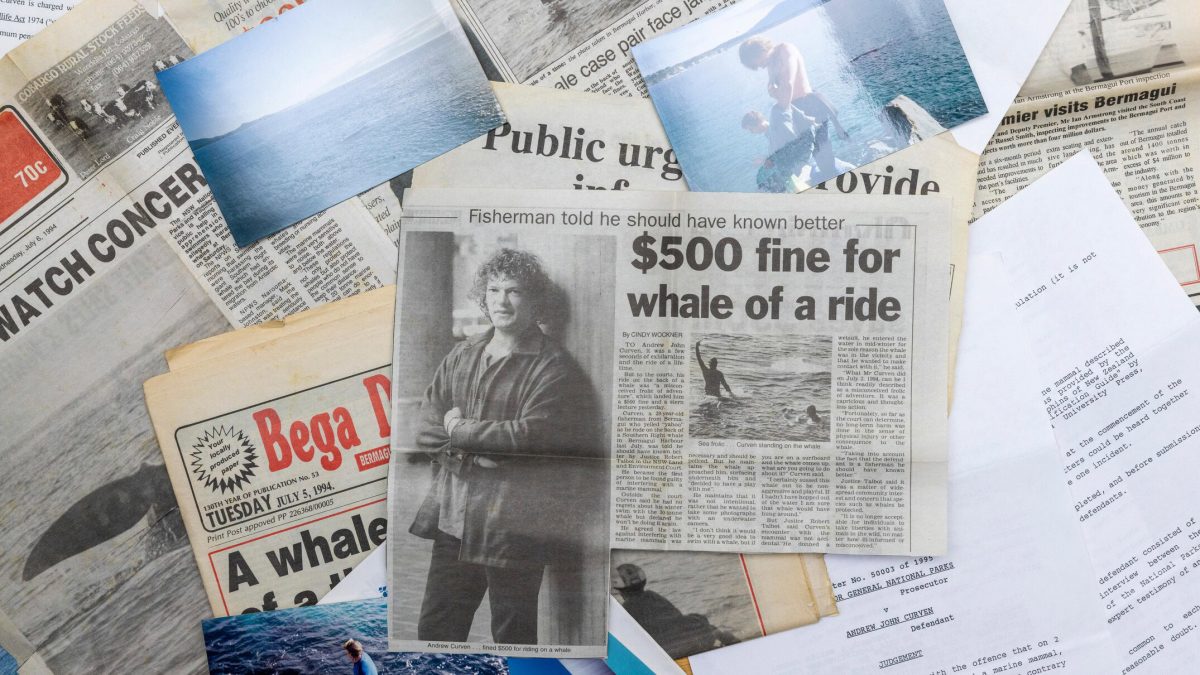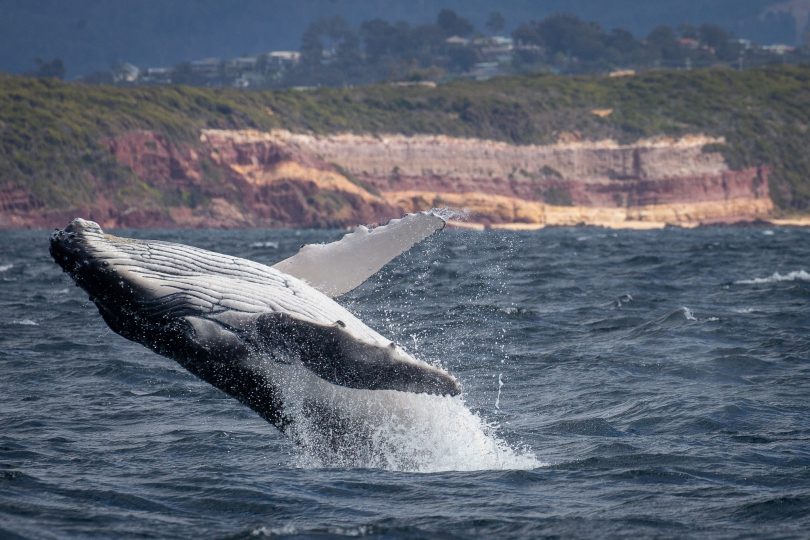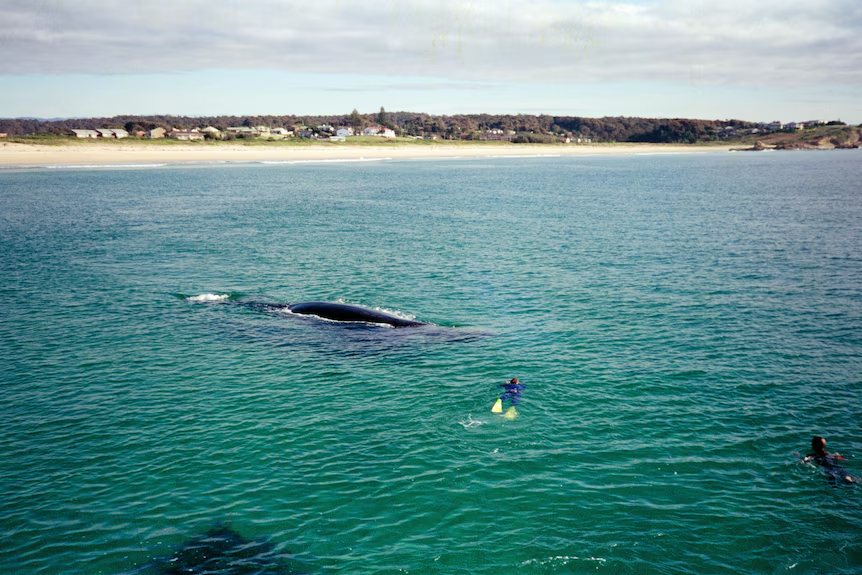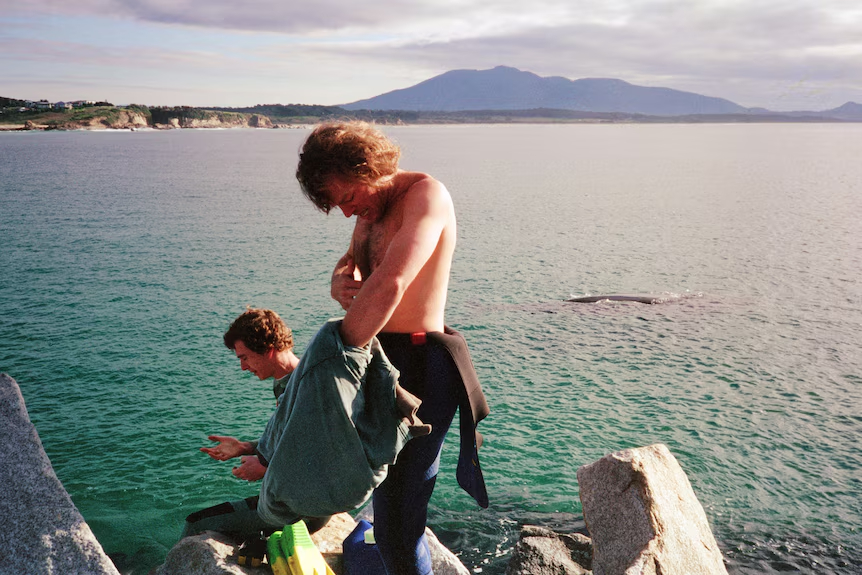
Newspapers reporting Bermagui fisherman Andrew Curven swimming with a southern right whale. Photo: Andrew Curven.
In hindsight, Andrew Curven, or ‘Lobba’, probably should have stayed in bed on that morning in 1994. Not that he really regrets what happened.
The Bermagui deep-sea fisherman had returned from a week trawling the Far South Coast waters for trout, and didn’t think much of the enormous southern right whale he’d encountered on the way back into the harbour – until his sister Nina Campbell-Brown woke him at 6 am.
“Come on, Andrew, you’ve got to come and get a photo of this whale,” she said.
“I know – I’ve already seen it – I bloody nearly ran over it,” he replied.
But he dutifully dressed and, by 9 am, was entering the water in his wetsuit with a plan to see how close he could get.
“You wouldn’t think something up to 100 tonnes could be so gentle, but it was doing tight circles around me with its head nearly touching its tail with me in the middle,” he recalled.
“It was really interacting with us, that’s for sure.”
Whales are no stranger to Bermagui. The town lies directly along their migration route south to Antarctica between September and November each year, and there’s a whole local tourism industry built on whale-watching cruises.

Southern right whales are listed as a threatened species in NSW, with numbers still recovering from when they were hunted for oil. Photo: Wayne Reynolds.
But up until then, no one had stood on top of one.
“One time, it just came up from underneath me and surfaced. I stood up and was actually just standing on top of the whale. It was about as wide as a car.”
He said the whole encounter – riding ‘whaleback’ along the beach – couldn’t have lasted longer than 30 minutes, but the calls from the shore to “leave it alone” were growing louder.
Unbeknownst to Andrew, the local policeman had phoned NSW National Parks and Wildlife, who were in quite a state about it.

In the water and swimming with the whale. Photo: Nina Campbell-Brown.
Two weeks earlier, two jet skiers had been caught terrorising a whale near Sydney. Now, with a second case, NSW rangers were keen to crack down on it and dust off a law from the 1980s about “approaching and interfering with a marine mammal” – as yet untested in court.
Andrew “just happened to be the first cab off the rank”. He was up for a $100,000 fine and two years in jail, plus legal costs.
The photos his sister had snapped from the rocks, initially for the family photo album, ended up splashed all over the nation’s newspapers.
The case dragged on for a year and seven hearings in the NSW Land and Environment Court in Sydney, initially with Andrew defending himself before high-profile lawyer Malcolm Ramage agreed to step up pro-bono. But Andrew remained as unfazed as ever.
“I just thought how stupid it was, and never really took it seriously,” he said.
“I cracked the judge up a few times … and the first thing he said was something along the lines of what a break this was from land disputes and how in all his years, he’d never dealt with anything like this.”

He’s going in. Photo: Nina Campbell-Brown.
In the end, the prosecutors offered a deal whereby all charges would be dropped in exchange for a $500 fine – which Andrew never paid, and the court never followed up on.
“If you don’t pay a fine and you’re a good boy for seven years, it goes away,” he claimed.
Today, 30 years on, all the locals still hail Andrew down the street as “whale man” and he won’t say no to swimming alongside another one, bearing in mind the rule to stay at least 30 metres away (300 metres if you’re a jetski or boat).
“I was actually swimming with one a few years ago,” he said.
“And no, I didn’t stand on it because I knew the rules by then. It’s just one of those stories that has always captured the imagination of people.”
Original Article published by James Coleman on Riotact.








